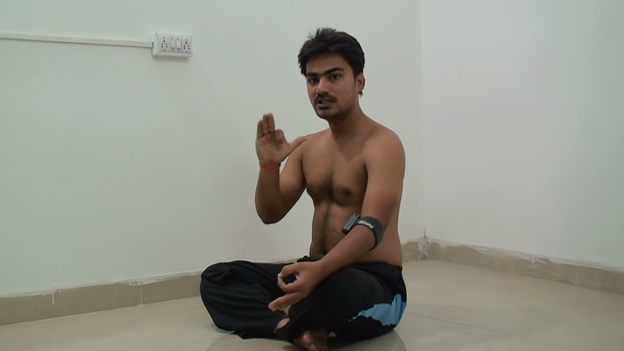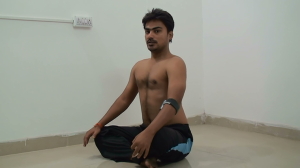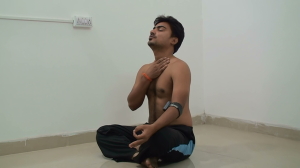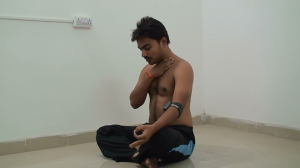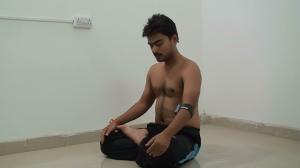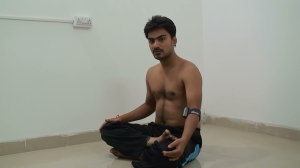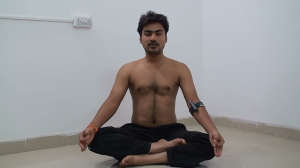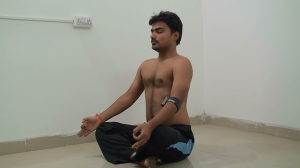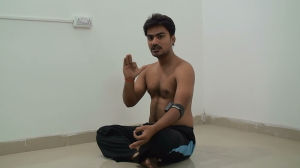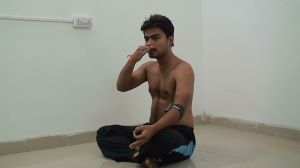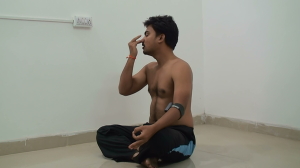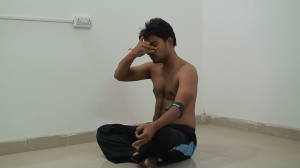Introduction:
Pratiloma Pranayama involves inhaling alternately between the left and right nostrils and exhaling through both nostrils together naturally . The thumb of the right hand is used to manipulate the right nostril, while the ring finger is used to control the left nostril.
Pratiloma means Inverted Anuloma (Inverted way of doing the anuloma), prati means reflection where as pranayama means breathing technique.
Glimpse of Pratiloma Pranayama
The ultimate aim of this pratiloma pranayama is to have long deep breaths inwards through alternating the nostrils and outwards through two nostrils in 1:2 ratio with out making much sound by closing your eyes in any one of the mudras.
Procedure:
Initially sit erectly such that the spine has to be straight and firm, shoulders have to be firm, position of head has to be still and can be moved up and down accordingly when you are in the process of breathing.
Now try to be in either padmasana or artha padmasana or siddhasana or sukasana.
Now the right hand fingers has to be in such a way that the index finger has to be folded, the right thumb should be used to close the right nostril and ring finger should be extended to close the left nostril.
So close your eyes try to be in half gyana mudra, be ready with your right hand, have a deep gentle long breath in through left nostril by closing the right nostril with the help of right thumb, concentrate on breathing, now have a deep long breath out through two nostrils naturally (the breathing shouldn’t be fast and audible). Head position should be moved accordingly up and down. Intensity is crucial.
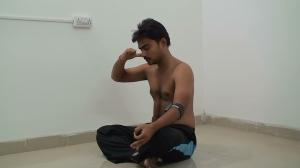
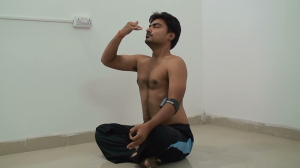
Similarly repeat the process in such a way that have a deep long breath in through right nostril by closing the left nostril with the help of ring finger and breath out through two nostrils naturally .
And fill the lungs not the stomach, your chest will be blown out when you inhale properly.
The ratio between breath ins and breath outs should be in 1:2 which means if time taken for breath in is 1 second then breath out should be 2 seconds. Try to increase the frequency like if time taken for breath in is 6 seconds then breath out should be 12 seconds.
So slowly open your eyes, feel your self and observe the flow of energy in your body. Relax for two or three minutes then go for other pranayama.
Repeat the cycles for alteast 5 to 10 times and try to practice for atleast 5 mins in a day.
Before starting any pranayma always prefer bhastrika pranayama initially which actually helps you in easing out your respiratory system.
Antara Kumbhaka:
Kumbhaka means retention which is nothing but holding the breath. This is the concept which should not be started directly by beginners. The concept is when you have deep long breaths inwards through either nostrils, then at this moment you got to hold the breath for some time and then try to breath out slowly through both the nostrils naturally.
The ratio of this process can be in 1:1:1 which is called sama vrtti ( Even Breaths ) – It implies, if time taken for breath in is 2 seconds then holding the breath has to be for 2 seconds and breathing out has to be 2 seconds.
The ratio can also be changed to 1:4:2 or 1:2:3 which is nothing but visama vrtti (Uneven Breaths). After consistent practice in doing this pranayama, you can go for kumbhaka.
Benefits of Pratiloma Pranayama:
- Cures B.P, Asthma, Diabetes and Migraine.
- Strengthens your mind
- Relieves you from stress
- Improves concentration and patience.
- Increases supply of oxygen.
- Apart from these benefits you are going to attain tranquility and self enlightment.
Full Video Tutorials
